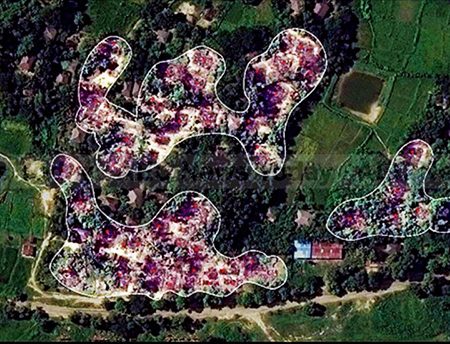At the same time as her army was being accused of raping, killing, and burning down the homes of ethnic Rohingya in Rakhine State, Myanmar State Counselor Aung San Suu Kyi was in Tokyo accepting a five year ¥800 billion (about US$7.73 billion) aid package from the Japanese government… 5 per cent of which is meant to be spent supporting the very ethnic minorities her troops are forcing to flee their homes.
Ignoring the violence occurring at the time (and which continues today) Japanese Prime Minister Shinzo Abe told a media briefing attended by Ms Suu Kyi, “we hope this aid will help spread the fruit of peace building to various regions in Myanmar, and drive it forward”.
While 95 per cent of the aid package will be spent on airports and electricity projects, ¥40 billion ($375.1 million) is allocated to supporting more than 130 ethnic minorities in the country.
In accepting the aid package Ms Suu Kyi said she will try to promote economic development and build peace within the country at the same time, adding the two efforts are “inseparable” from each other.

However, the two leaders did not mention alleged human rights abuses of Rohingya Muslims by Myanmar soldiers in Rakhine State, and also ignored an inspection to be carried out by international diplomats and UN officials just two-days later (See: Envoys Spend Second Day in Rakhine State as Aid Ban Lifted).
Ms Suu Kyi has previously promised that she will try her best to ease a number of ongoing ethnic conflicts in her country.
Described as the “final frontier within Asean” given its potential natural resources, Myanmar is emerging from almost 50 years of economic mismanagement by a military dictatorship that has left vital infrastructure such as roads, airports and electricity supply in disarray.
To help Myanmar close the infrastructure gap Japan’s Ministry of Foreign Affairs said Japan will also provide up to ¥10.8 billion ($101.280 million) in loans for refurbishing two ageing hydroelectric power plants, adding that demand for electricity is expected to rise in tandem with the country’s development.
Ms Suu Kyi said Myanmar’s economy “needs to be developed in every sector”, adding that a slowdown in global growth was adding to the country’s economic difficulties: “We need a lot of investment and many economic experts with fresh ideas”, she said.
Japanese investment and robust bilateral ties are vital for Myanmar to counter its largest trading partner, China. Japan’s offers of assistance to Myanmar are seen as competition with China for economic and political influence in the Southeast Asean country.
According to Prime Minister Shinzo Abe: “As a friend of Myanmar, Japan will give the new government our full support across the public and private sectors.”
While Japan see’s a bigger future for it in Myanmar, the country’s largest trading partner remains China, which Ms Suu Kyi visited in August on her first overseas trip outside Southeast Asia following her party’s election victory last November.
At the time she met with Chinese President Xi Jinping and Premier Li Keqiang with discussions including the Chinese-backed US$3.6 billion Myitsone dam, suspended in 2011 over environmental and other concerns, and other controversial Chinese hydro-power projects
According to Chinese state media, China has invested heavily in the Myanmar oil and gas sector over the years, with bilateral trade reaching more than US$10 billion last year.
Feature video uploaded to TouTube by AP Archive
Related:
- Japan to provide $7.73 billion in aid to Myanmar, PM Abe says (Reuters)
- Japan competes with China for Myanmar influence with 800 billion yen aid deal
(South China Morning Post) - Abe meets Suu Kyi, extends ¥40 billion aid package aimed at Myanmar’s ethnic minorities (The Japan Times)

